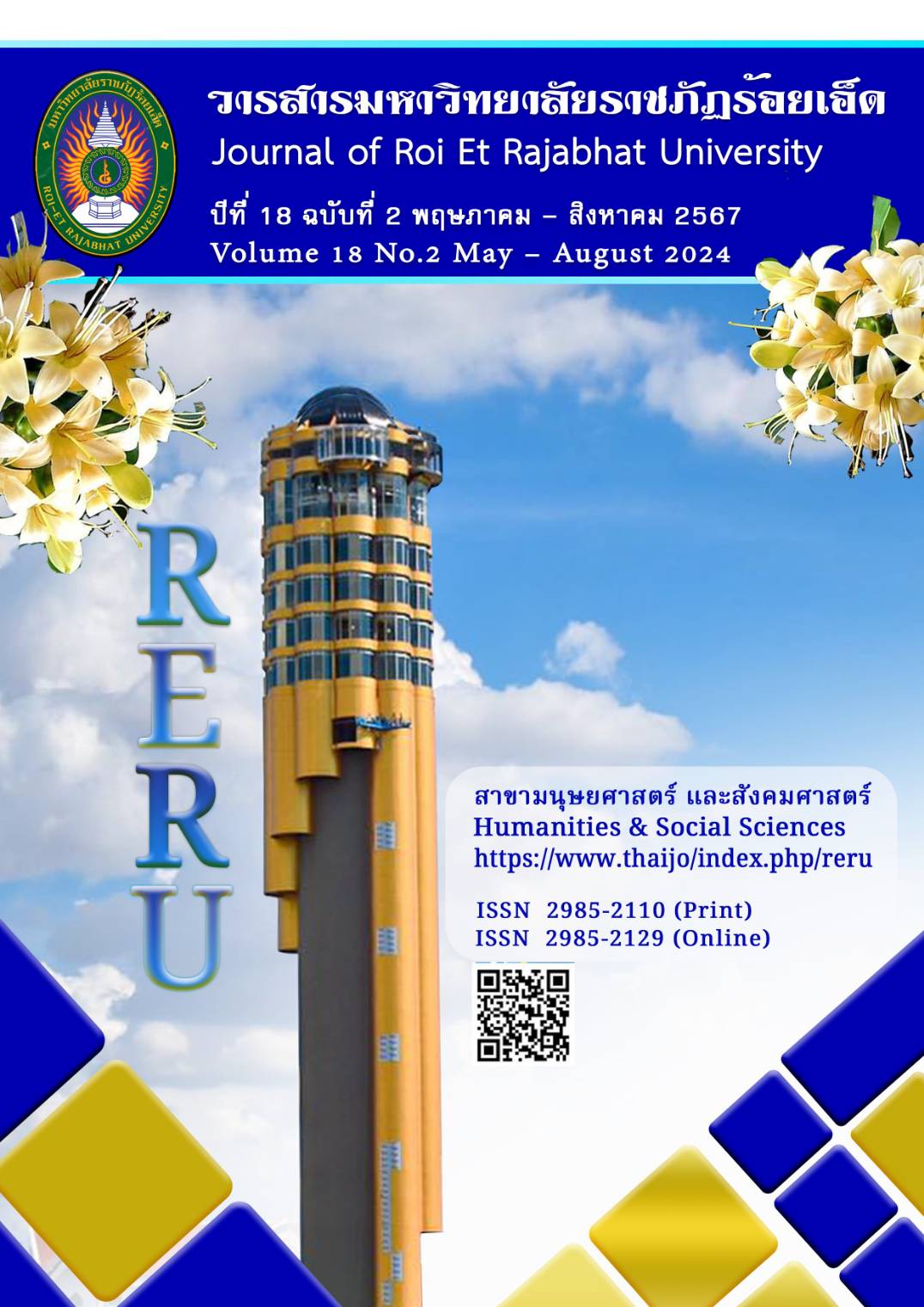Project-based Learning to Create Environmentally Literate Citizens through the Course on Population and Environment
Keywords:
Learning management, Project-basedAbstract
This research used qualitative method and the purposes were as follows: 1) To study the current environmental problems through students' perceptions in the course on Population and Environment. 2) To study the integrated learning approach of students in creating environmentally literate citizens through the course on Population and Environment. For the study method, qualitative research was used to collect data through structured interviews and using the project-based learning for field work at school. The sample group was the 59 third-year social studies students at Sisaket Rajabhat University enrolled in the course on Population and Environment in the second semester of the academic year 2022. The complete collected data were analyzed in terms of content and thematic analysis. From the study, it was found that the students had have cognition in current environmental problems such as global warming problem, plastic waste problem, soil resource problem and air pollution problem. The students presented the approaches for various environmental problem solving such as 1) Recycling various materials for maximum benefit 2) Planting trees to replace cut down trees, reforestation, for wildlife habitat 3) Promoting environmental conservation, reforestation, and proper garbage disposal. 4) Economical utilization of resources and 5) Choosing to use good energy and technology for the earth. The section of integrated learning management for students, the sufficiency economy project was created in school. Vegetables are planted for making school students’ lunch. Another project was about garbage sorting in order to provide students with knowledge and awareness of the importance of garbage problem and handling. The waste separation and utilization to reduce the amount of school waste. After completing both students’ projects, the school has continued the project. The school students have participated in the Sufficiency Economy Project; growing vegetables to eat and sell for making income. The garbage separation section, students have known about garbage and separated them before throwing away, and practicing the good behavior in garbage disposal for students.
References
กุลิสรา จิตรชญาวณิช. (2562). การจัดการเรียนรู้. กรุงเทพฯ: จุฬาลงกรณ์มหาวิทยาลัย.
ฐากร สิทธิโชค. (2559). การจัดกระบวนการเรียนรู้สิ่งแวดล้อมในสถานศึกษา. วารสารมนุษยศาสตร์ มหาวิทยาลัยทักษิณ, 11(ฉบับพิเศษ), 177-197.
ฐากร สิทธิโชค, มัลลิกา ใจเย็น และวิทวัส นิดสูงเนิน. (2563). แนวทางการจัดการเรียนรู้สิ่งแวดล้อมศึกษา. สุพรรณบุรี: สำนักงานเขตพื้นที่การศึกษาประถมศึกษาสุพรรณบุรี เขต 3.
ชลิดา จูงพันธ์ และนฤพจน์ พุธวัฒนะ. (2563). วิธีการจัดการเรียนการสอนสิ่งแวดล้อมในโรงเรียนสิ่งแวดล้อมศึกษาเพื่อการพัฒนาที่ยั่งยืน: กรณีศึกษาโรงเรียนในจังหวัดปทุมธานี. วารสารหน่วยวิจัยวิทยาศาสตร์ เทคโนโลยี และสิ่งแวดล้อมเพื่อการเรียนรู้, 11(1), 115-130.
ชรินทร์ มั่งคั่ง. (2561). การถ่ายทอดองค์ความรู้ศาสตร์พระราชาของครูศูนย์การเรียนรู้ชุมชน เพื่อส่งเสริมความเป็นพลเมืองวิถีเขียวของผู้เรียนในพื้นที่โครงการหลวงภาคเหนือของไทย. Veridian E-Journal, Silpakorn University, 11(1), 1503-1521.
ชัยภัทร ศรีทุมมา. (2565). การพัฒนากิจกรรมการเรียนรู้เรื่อง ปัญหาสิ่งแวดล้อม เพื่อส่งเสริมสมรรถนะของนักเรียนช่วงชั้นที่ 4. วิทยานิพนธ์ การศึกษามหาบัณฑิต สาขาวิชาสังคมศึกษา. พิษณุโลก: มหาวิทยาลัยนเรศวร.
ชัยภัทร ศรีทุมมา (2566). การพัฒนากิจกรรมการเรียนรู้เรื่องปัญหาสิ่งแวดล้อมเพื่อส่งเสริมสมรรถนะหลักของนักเรียนช่วงชั้นที่ 4 ในชุมชนทรัพย์ไพรวัลย์ ตำบลวังทอง จังหวัดพิษณุโลก. วารสารบัณฑิตแสงโคมคำ, 8(1), 34-49.
ชัยอนันต์ สมุทรวณิช. (2545). คู่มือการเรียนการสอนพลเมือง – พลโลก การบูรณาการการเรียนรู้จากประสบการณ์จริง ตามแนวทางรัฐธรรมนูญและพระราชบัญญัติการศึกษาแห่งชาติ. กรุงเทพฯ: คุรุสภาลาดพร้าว.
ณิรดา เวชญาลักษณ์. (2561). หลักการจัดการเรียนรู้. กรุงเทพฯ: จุฬาลงกรณ์มหาวิทยาลัย.
ถนอมศรี สิทธิเดช. (2561). การมีส่วนร่วมภาคพลเมืองในการปฏิบัติตามกฎหมายสิ่งแวดล้อม. วารสารวิทยาลัยนครราชสีมา, 12(2), 262-270.
ทิพย์พาพร ตันติสุนทร. (2558). การศึกษาเพื่อสร้างพลเมือง. กรุงเทพฯ: สถาบันนโยบายการศึกษา.
ธเนศ เกษศิลป์ และชนันนา รอดสุทธิ. (2561). ปัจจัยที่มีผลต่อทัศนคติและพฤติกรรมในการอนุรักษ์สิ่งแวดล้อมของนักเรียนระดับชั้นมัธยมศึกษาในโรงเรียนที่ตั้งอยู่ใกล้คลองสาธารณะ: กรณีศึกษาโรงเรียนทีปังกรวิทยาพัฒน์ (ทวีวัฒนา) ในพระราชูปถัมภ์ สมเด็จพระบรมโอรสาธิราชฯ สยามมกุฎราชกุมาร. วารสารปัญญาภิวัฒน์, 10(3), 283-296.
เบญจวรรณ กี่สุขพันธ์. (2559). หลักการและแนวคิดการจัดการเรียนรู้. กรุงเทพฯ: ซีเอ็ดยูเคชั่น.
รัตติกร โสมสมบัติ, อุทัย บุญประเสริฐ และพิณสุดา สิริธรังศรี. (2563). รูปแบบการส่งเสริมการจัดการเรียนรู้สิ่งแวดล้อมศึกษา เพื่อการพัฒนาอย่างยั่งยืนในวิทยาลัยอาชีวเอกชน. วารสารสันติศึกษาปริทรรศน์ มจร, 8(3), 1110-1124.
รัตติกร โสมสมบัติ. (2562). รูปแบบการส่งเสริมการจัดการเรียนรู้สิ่งแวดล้อมศึกษาเพื่อการพัฒนาอย่างยั่งยืนในสถานศึกษาอาชีวศึกษาเอกชน. ดุษฎีนิพนธ์ ศึกษาศาสตรดุษฎีบัณฑิต สาขาวิชาการจัดการศึกษา. กรุงเทพฯ: มหาวิทยาลัยธุรกิจบัณฑิต.
รุ่งนภา ตาดเงิน ชรินมั่งคั่ง และแสวง แสนบุตร. (2564). แนวทางการจัดการเรียนรู้บูรณาการสิ่งแวดล้อมเพื่อส่งเสริมทักษะความเป็นพลเมืองสิ่งแวดล้อมของนักเรียนชั้นมัธยมศึกษา โรงเรียนอุดมดรุณี. วารสารมนุษยศาสตร์และสังคมศาสตร์ มหาวิทยาลัยพะเยา, 9(2), 53-71.
เสรี วรพงษ์. (2561). สิ่งแวดล้อมกับการพัฒนาที่ยั่งยืน. วารสารสังคมศาสตร์บูรณาการ, 1(1), 161-176.
Hawthorne, M. and Alabaster, T. (1999). Citizen 2000: development of a model of environmental citizenship. Global Environmental Change, 9(1), 25-43.
Rachman, F. and Muchtar, A. S. (2018). Sustainable Development Discourses on Construction of Citizen Participation in Community Care for Environment. Annual Civic Education Conference (ACEC 2018), 346-349.
Downloads
Published
How to Cite
Issue
Section
License
Copyright (c) 2024 Roi Et Rajabhat University

This work is licensed under a Creative Commons Attribution-NonCommercial-NoDerivatives 4.0 International License.
บทความที่ได้รับการตีพิมพ์เป็นลิขสิทธิ์ของวารสารมหาวิทยาลัยราชภัฎร้อยเอ็ด
ข้อความที่ปรากฏในบทความแต่ละเรื่องในวารสารวิชาการเล่มนี้เป็นความคิดเห็นส่วนตัวของผู้เขียนแต่ละท่านไม่เกี่ยวข้องกับมหาวิทยาลัยราชภัฎร้อยเอ็ด และคณาจารย์ท่านอื่นๆในมหาวิทยาลัยฯ แต่อย่างใด ความรับผิดชอบองค์ประกอบทั้งหมดของบทความแต่ละเรื่องเป็นของผู้เขียนแต่ละท่าน หากมีความผิดพลาดใดๆ ผู้เขียนแต่ละท่านจะรับผิดชอบบทความของตนเองแต่ผู้เดียว





